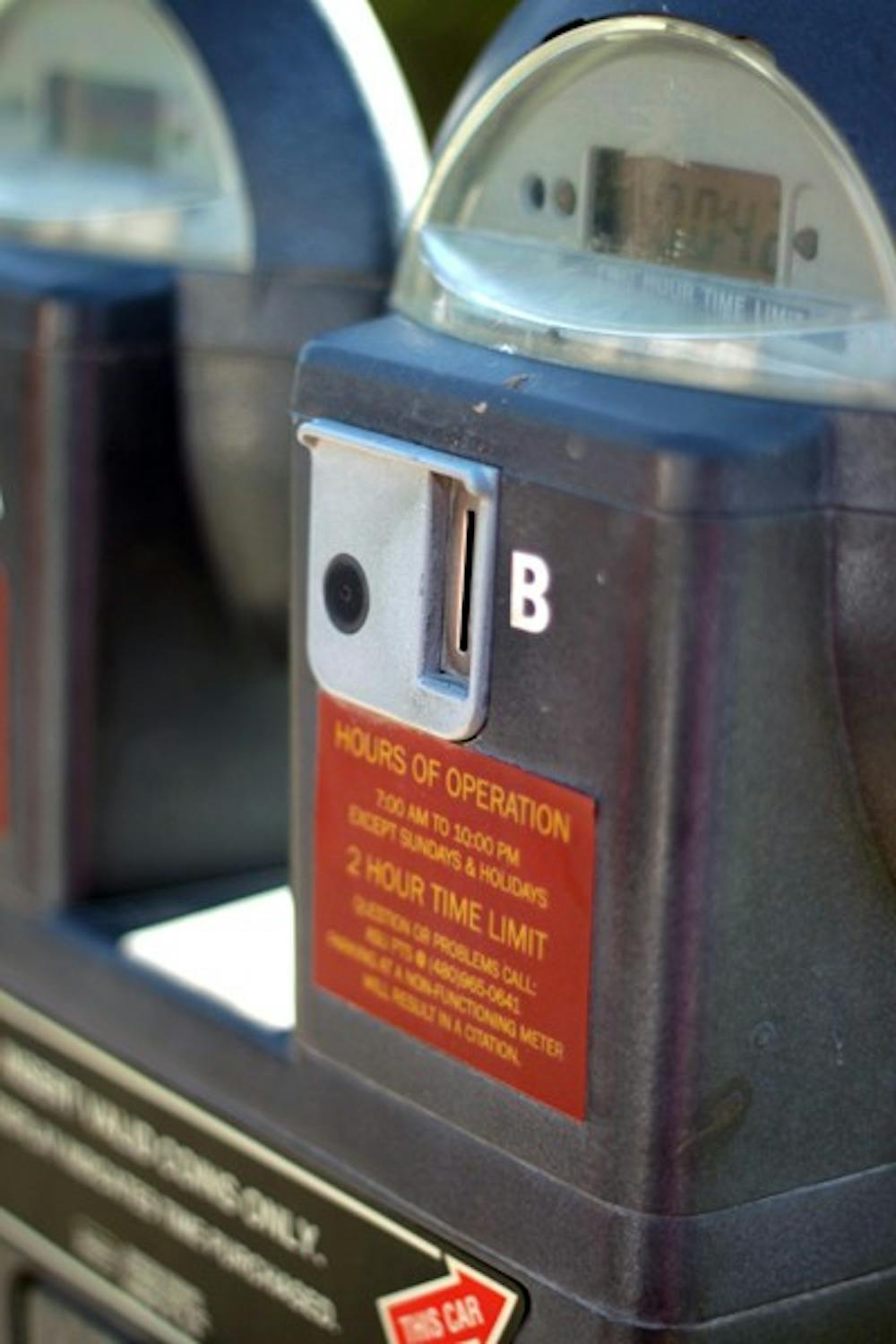 House Bill 2086 would require that cities regularly check on and maintain parking meters like this one on Gammage Parkway and South Forest Avenue to ensure they are functioning properly. Rep. Chad Campbell, D-Phoenix, authored the bill in frustration after parking meters in downtown Phoenix stole his change. (Photo by Ashley Kesweder)
House Bill 2086 would require that cities regularly check on and maintain parking meters like this one on Gammage Parkway and South Forest Avenue to ensure they are functioning properly. Rep. Chad Campbell, D-Phoenix, authored the bill in frustration after parking meters in downtown Phoenix stole his change. (Photo by Ashley Kesweder)A bill calling for parking meter maintenance would require cities such as Tempe and Phoenix to randomly inspect, test and maintain parking meters to prevent meter users from receiving unwarranted citations.
Sponsored by Rep. Chad Campbell, D-Phoenix, House Bill 2086 is a response to Campbell's frustration with downtown Phoenix parking meter troubles, as well as complaints from constituents and small business owners.
"I've personally experienced the parking meters eating my money on a daily basis," Campbell said. "It's frustrating for those of us that work in downtown."
He said the parking meters continue to make ordinary tasks, such as eating at local restaurants, a tedious struggle.
It's crucial that these machines are working properly, as most people cannot continually carry around $10 in change, Campbell said.
The bill has received criticism from some municipalities that believe the requirements would be too costly to maintain, he said.
"Cities say they already do this," he said. "If they do this, then why would this be an added expense? I'm a little skeptical that they're actually doing it."
He said municipalities that do not properly calibrate their meters regularly and allow them to fall into disrepair are stealing from residents.
Although dysfunctional meters have been a problem, Campbell said he has seen considerable improvement in meter technology during the past couple of years. While coin-operated meters run the risk of jamming or having an inaccurate timer, the implementation of digital credit and debit card parking meters is an easy fix that is gaining popularity throughout the Valley, he said.
"I'm glad to see we're getting parking meters that are up to date with the 21st century," Campbell said.
As of the beginning of February, Phoenix is in the process of converting 545 coin-operated machines, primarily in the Downtown area, into meters that also accept credit and debit cards.
Campbell said business accessibility improved in Phoenix after a February 2012 Phoenix City Council decision that parking meter enforcement run from 8 a.m. to 5 p.m. Monday through Friday rather than 7 a.m. to 8 p.m.
Approximately 2,400 parking meters are operated out of the downtown, uptown and Phoenix College areas, according to the city of Phoenix website.
The hourly fee for parking is $1.50.
Thomas Godbee, deputy street transportation director for the city of Phoenix, said the city already maintains parking meters located in core areas, such as around the Arizona State Capitol, each month.
Godbee said the credit and debit card meters will be more efficient at reporting maintenance issues and will send city officials an automated text message when an operating problem is detected.
"We think (the debit and credit meters are) really going to help downtown business and customers," he said.
Downtown Tempe meters run from 8 a.m. to 10 p.m. Monday through Saturday for credit card payment meters and 8 a.m. to 6 p.m. Monday through Saturday for coin payment meters, according to the Downtown Tempe Community website.
The Downtown Tempe Community is a nonprofit organization that manages the downtown parking meters, of which there are nearly 600 throughout the Mill Avenue District alone.
Adam Jones, deputy director of the Downtown Tempe Community, said the bill wouldn't change regulations for Tempe because most meters are calibrated daily.
He said the meters are checked weekly, and any problems are responded to within the day.
"You might get a complaint every now and then where they get jammed," Jones said. "Someone might put a slug in a meter, or a paper clip or a bent coin."
He said use of credit and debit card-accepting meters gives residents and students another option and added convenience.
"Instead of fumbling through their pockets for coins ... everyone usually has a debit or credit card," Jones said.
He said the Downtown Tempe Community takes very seriously the need to ensure all equipment is functioning properly.
Campbell said the bill would demand fairness and accountability from local governments. It has been approved by the House Government committee and is awaiting a vote from the whole House.
"For a student, for a non-student, for anybody that's going to downtown Phoenix and Tempe, when you put your money in (a parking meter,) you expect to see the time go up," he said.
Reach the reporter at dgrobmei@asu.edu or follow her on Twitter @danigrobmeier




